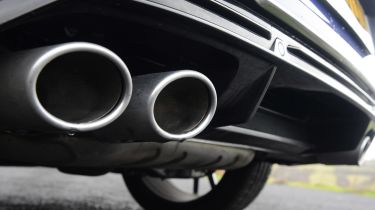Exhaust noise: what to do about a noisy car exhaust
An unusual noise from your car’s exhaust might suggest something’s wrong – these are the most common causes and what you should do

You can’t beat the sound of a finely tuned engine, but an unusual exhaust noise isn’t music to anyone’s ears. A noisy exhaust isn’t just an annoying distraction – it could be a sign that something is wrong with your car. Whether it’s an irritating rattle, a hiss, or an all-out roar, these sounds can indicate various issues ranging from small to serious.
So, what exactly is causing your exhaust noise, and what should you do about it? Read on to find out the most common causes of a noisy exhaust and how you can fix them.
Common causes of exhaust noise
Your car’s exhaust system is a complex assembly of components that work together to manage the gases produced by the engine. Over time, parts can corrode, loosen, or get damaged, leading to a range of different noises. Here are some of the most common culprits:
1. Exhaust leaks
One of the most frequent causes of an unusually loud exhaust is a leak somewhere in the system. These leaks can occur due to rust, corrosion, or physical damage to the exhaust pipes, muffler, or joints. If there’s a hole or crack in any part of the system, it can cause the engine noise to escape before it’s been properly silenced by the muffler, leading to a loud exhaust note. It can also create a hissing or popping sound, where gases are escaping and allowing the metal of the exhaust to heat up and expand.
An exhaust leak may also affect the performance of your car, and could trigger an engine warning light. Sometimes, an exhaust leak will allow fumes to enter the cabin, which could be harmful to you and your passengers.
What to do: Start by listening closely to where the noise is coming from. You can often spot exhaust leaks by looking for soot or black marks around the exhaust system, which indicate escaping gases. If you suspect a leak, it’s important to get it repaired quickly. Small leaks can sometimes be patched, but in many cases, a section of the exhaust may need to be replaced.
2. Faulty muffler
The muffler plays a crucial role in reducing the noise produced by your car’s engine. If your car is suddenly much louder than usual, the muffler might be to blame. Over time, the muffler can develop holes or loosen from the exhaust system due to corrosion or impact damage. When this happens, it can’t do its job properly, and the exhaust noise can get a lot louder.
What to do: The muffler will be found towards the rear of the exhaust. Inspect it for signs of rust, holes, or cracks. If the muffler is visibly damaged, it will need to be replaced. Mufflers aren’t typically repairable, so replacement is usually the only option. Fortunately, replacing a muffler shouldn’t be overly expensive, and it can drastically reduce the noise from your exhaust.
3. Broken exhaust mount
Exhaust mounts are small support brackets that secure the exhaust system to the underside of your car. These mounts keep the exhaust in place, preventing it from rattling or sagging. If a mount breaks or becomes loose, the exhaust system can move out of position, causing it to knock against the underside of the car or other components, or hang too low and be at risk of catching on speed bumps. This can result in a rattling noise, especially when driving over bumps or rough terrain.
What to do: If you hear a rattling noise coming from under your car, check to see if the exhaust is loose or sagging. If you spot a broken or loose mount, it’s a relatively simple fix. You can purchase a replacement mount and install it yourself if you’re handy with tools, or you can take your car to a mechanic to have it fitted. Just remember to ensure the exhaust has fully cooled before working on it, as it will get very hot when the engine has been running.
4. Catalytic converter issues
The catalytic converter is an essential part of your car’s exhaust system, responsible for reducing harmful emissions. However, it can also create unwanted noises if it becomes damaged or clogged. A failing catalytic converter might produce a rattling noise, particularly at idle or during acceleration. This can happen when the inside of the catalytic converter degrades due to age, excessive heat, or impact damage. A broken catalytic converter can also trigger an engine management light and cause your engine to run poorly.
What to do: Diagnosing a faulty catalytic converter usually requires a professional inspection, as it’s often hard to access. If your catalytic converter is damaged, it will probably need to be replaced. Unfortunately, catalytic converters can be expensive, but they are essential for your car’s performance and MoT emissions compliance, so don’t delay the repair.
5. Loose or damaged heat shields
Heat shields are metal plates designed to protect the underbody of your car from the extreme heat produced by the exhaust system. Over time, these shields can become loose or corroded, especially as your car gets older. When a heat shield becomes loose, it can vibrate against the exhaust or other parts of the car, creating a metallic rattling noise.
What to do: Inspect the underside of your car for any loose or hanging heat shields. If you find one that’s not securely fastened, it can usually be reattached with new bolts or clamps, but only attempt this yourself if your engine has been switched off for some time – exhausts get very hot. In some cases, if the shield is too damaged, you might need to replace it. Since heat shields are critical for preventing heat damage to other parts of your car, it’s important to address this issue promptly.
When to seek professional help
While some exhaust issues can be diagnosed and fixed at home, there are times when it’s best to leave it to the professionals. If you’re unsure about the cause of the noise or if the problem persists after a DIY attempt, a good mechanic should be able to help you out. They can provide a thorough inspection, accurate diagnosis, and recommend the best course of action.
Don’t forget that exhaust systems get very hot. If you attempt to repair your exhaust at home, make sure your engine has been switched off for a while to allow your exhaust system to cool down.
Frequently Asked Questions
Unusual exhaust noises can be caused by numerous things, but an exhaust leak is often the culprit. A crack, hole or damage to your exhaust can create a loud exhaust note, or a hissing or popping noise. A rattling sound means something is loose, such as an exhaust hanger, muffler or heat shield.
More on car problems
Recommended

Classic car tax exemption: which historic vehicles qualify?
Most Popular
Tips & advice

Car dashboard warning lights: what does each symbol mean?

Electric car charging stations: public networks, charger types, apps and maps








